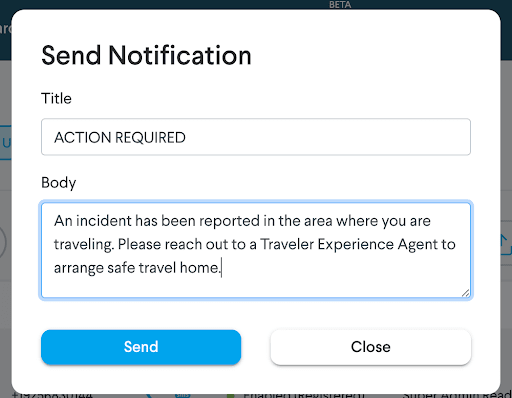Navan’s Modern Approach to Duty of Care

There are dozens of reasons to encourage employees to book travel and manage expenses through a single, centralized travel and expense platform. However, one aspect that is often overlooked is the duty of care.
The definition of duty of care is an organization’s moral obligation and legal obligation to monitor the safety and well-being of its employees. For companies asking employees to travel, a duty of care applies to practices, policies, business decisions, and even the healthcare that employers extend to employees in their working environment and outside the office.
Maintaining that duty of care becomes more challenging as organizations expand since the number of employees traveling on the company’s behalf increases.
With increased risk comes the need for increased duty of care. And setting a high bar for duty of care means actively tracking employees. A realistic duty of care policy goes hand-in-hand with effective travel risk management. That risk varies based on an organization’s size, industry, and scope of business travel. But evaluating how the company delivers on its duty of care is critical, especially when travel has an important role as a strategic lever for culture and growth.
Past surveys have found business travelers are split down the middle when it comes to their confidence in their employer to provide immediate help or assistance in the event of travel disruption. Organizations need to do better.
As a customer-obsessed organization, Navan wants to ensure travelers using our technology are cared for at every step of the journey. Business travel sometimes means taking a rideshare across town for a client lunch, but other times it means trekking halfway around the world — and it’s important for travelers to feel that Navan has their backs every step of the way.
Why Duty of Care Matters
Duty of care is about being prepared for whatever might happen, and it is essential to any comprehensive business travel program. Implementing duty of care is essential for building a culture of safety and trust so employees feel safe and empowered to travel for work.
Communication is key to exceeding duty of care obligations and establishing a foundation of good faith outside strict legal terms.
The growth of remote work and globally distributed teams has only accelerated this need, as laws and legal duties vary by location. While HR teams, risk managers, travel managers, and cybersecurity experts traditionally managed general duty of care, Navan was built on the belief that duty of care is best executed when every reasonable person has a role.
Achieving that goal means investing time and money, mostly around planning and implementing best practices.
HR teams and internal marketing leaders can collaborate on materials highlighting what duty of care means at the particular company, examples of duty of care in action, and proactive game plans for extraordinary circumstances.
While the outdated approach to duty of care may have accounted for monitoring employees’ locations, a modern duty of care takes a more holistic approach.
The latest technology has tools to track critical events, recommend safeguards, and encourage a standard of care so organizations can go beyond the expectation of reasonable care to protect their team members — no matter where they are in the world.
Navan’s Modern Approach to Duty of Care
Navan’s proactive approach to duty of care provides teams with the tools to avoid breach of duty or questions about product liability. This 360-degree approach establishes a foundation of mutual respect and care between a company and its employees.
Here are a few of Navan’s foundational principles for building a modern duty of care program:
- Overcommunicate. Make pertinent info readily accessible and available for anyone and everyone in the organization. This practice helps keep everyone on the same page, aligns stakeholders around business judgment rules, and minimizes risk.
- Leverage technology. Backed by AI and machine learning, the Navan admin dashboard provides managers and teams with the data they need to take care of employees and respond in exceptional circumstances.
- Be proactive. Think about what could go wrong from all perspectives. Run exercises and practice drills until similar circumstances come up and put the plan into place.
- Be accessible. Employees need access to information 24/7/365 through multiple avenues. Leverage tools that provide omnipresent support should disruptions occur.
- Be personal. Prioritize personal outreach when something goes wrong; it puts employees at ease and ensures they feel well cared for.
That last bullet is particularly important. While we are proponents of augmenting duty of care and risk management strategies with machine learning and safety software, proactive face-to-face conversations and live crisis communications make all the difference when caring for employees.

Duty of Care Best Practices
A global benchmarking study from International SOS was designed so organizations worldwide could compare duty of care policies and develop best practices to protect and support the global mobility of their employees and dependents. The study uncovered important gaps, which led to the following recommendations for best practices:
- Increase awareness
- Plan with key stakeholders
- Expand policies and procedures
- Conduct due diligence
- Communicate, educate, and train
- Assess risk before every employee trip
- Track traveling employees at all times
- Implement an employee emergency response system
- Implement additional management controls
- Ensure vendors are aligned
The study also found that while organizations face unique risk challenges, they cope with similar risks differently. Thankfully, organizations are becoming more aware of duty of care responsibilities. That’simportant, because all countries contain risks for employers, and the duty of care extends beyond nature and man-made disasters. While organizations are becoming more aware, most fail to plan and implement a global duty of care strategy.
Strong delivery on the duty of care will ultimately enable travel managers to provide additional value to their company by championing more than the travel program.
This content is for informational purposes only. It doesn't necessarily reflect the views of Navan and should not be construed as legal, tax, benefits, financial, accounting, or other advice. If you need specific advice for your business, please consult with an expert, as rules and regulations change regularly.
More content you might like
Take Travel and Expense Further with Navan
Move faster, stay compliant, and save smarter.
